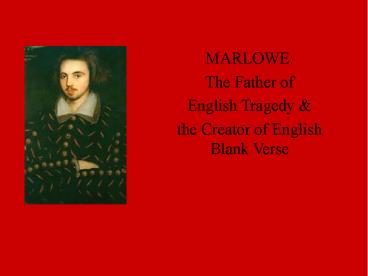MARLOWE: - PowerPoint PPT Presentation
Title:
MARLOWE:
Description:
Title: PowerPoint Presentation Author: Robin Smith Last modified by: SCS Created Date: 10/16/2004 7:24:33 PM Document presentation format: On-screen Show – PowerPoint PPT presentation
Number of Views:347
Avg rating:3.0/5.0
Title: MARLOWE:
1
- MARLOWE
- The Father of
- English Tragedy
- the Creator of English Blank Verse
2
Marlowes Poetic Language
- Inverted structure
- Blank verse
- Elaborate comparisons
- Imagery
- Rhetorical symmetry
3
Inverted Structure
- O what a cozening doctor was this! (4.5.31).
- Learnèd Faustus, / To find the secrets of
astronomy / Graven in the book of Joves high
firmament, / Did mount him up to scale Olympus
top / Where, sitting in a chariot burning bright
/ Drawn by the strength of yokèd dragons necks /
He views the clouds, the planets, and the stars.
. . . (3.Chorus.1-6).
4
Blank Verse
- Mephistophilis. Within the bowels of these
elements / Where we are tortured and remain
forever. / Hell hath not limits nor is
circumscribed / In one self place, but where we
are is hell, / And where hell is there we ever
shall be (2.2.125-29).
5
Elaborate comparisons
Hell strives with grace for conquest in my
breast. / What shall I do to shun the snares of
death? (5.1.68-71).
6
Imagery
- My God, my God, look not so fierce on me. /
Adders and serpents, let me breathe awhile. /
Ugly hell, gape not, come not, Lucifer! (5.2.
191-199).
7
Rhetorical symmetry
- Cut is the branch that might have grown
fullstraight, / And burnèd is Apollos laurel
bough, / That sometime grew within this learnèd
man. / Faustus is gone. Regard his hellish fall,
/ Whose fiendful fortune may exhort the wise /
Only to wonder at unlawful things, / Whose
deepness doth entice such forward wits, / To
practice more than heavenly power permits
(5.3.20-28).
8
Importance to Poetry
- A. C. Swinburne, critic Marlowe was the father
of English tragedy and the creator of English
blank verse. - Tamburlaine Prologue shows Marlowes contempt for
stage verse of the period jygging vaines of
riming mother wits presented the conceits
which clownage keepes in pay. - Dramatic poets of 16th c followed where Marlowe
led
9
Multi-Dimensional Characters
- Is Faustus completely good or bad?
- Does Faustus change during the course of the
play? - Is Mephistophilis completely evil?
- Marlowes characters are much more fully
developed than the characters in medieval plays.
10
Importance to Tragedy
- Blank verse
- Poetic language
- Multi-dimensional protagonists
- Humorous subplots that parallel larger themes
- Episodic treatment of events
11
Epitaph for Marlowe
- Cut is the branch that might have grown full
straight, / And burnèd is Apollos laurel bough,
/ That sometime grew within this learnèd man
(5.3.20-22).
12
Sources Barnet, Sylvan, ed. Introduction.
Doctor Faustus. Christopher Marlowe. New York
Signet Books, 1969. vii-xix.Bevington, David.
General Introduction. The Complete Works of
Shakespeare. New York HarperCollins, 1992. Rpt.
in Doctor Faustus Divine in Show. Ed. McAlindon,
T. Twaynes Masterworks Studies. New York
Twayne, 1994. 152-170.Duncan-Jones, Katherine.
Devil May Care. New Statesman 131 (1996)
42-44.McAlindon, T. Doctor Faustus Divine in
Show. Twaynes Masterworks Studies. New York
Twayne, 994. The Sixteenth Century
I1485-1603) Introduction. The Norton Anthology
of English Literature. 6th ed. Ed. M. H. Abrams.
New York W. W. Norton,1996. 253-273. Stenning,
Rodney. The Burning Chair in the B-text of
Doctor Faustus. Notes and Queries 43 (1996)
144-145. Stumpf, Thomas A. Images and Music.
Freshman Seminar Visits to Hell. (2001). 29
Sept. 2004.lthttp//www.unc.edu/courses/2001fall/en
gl/006m/005/thumbnails.html.gtWalton, Brenda.
Lessons for Marlowes Doctor Faustus. Orlando,
FL Network for Instructional TV, 1998. 12 Oct.
2004. lthttp//www.teachersfirst.com/lessons/marl.h
tmgt.




























![[PDF] Raymond Chandler: The BBC Radio Drama Collection Android PowerPoint PPT Presentation](https://s3.amazonaws.com/images.powershow.com/10089798.th0.jpg?_=202408011210)
![[PDF] DOWNLOAD Edward II PowerPoint PPT Presentation](https://s3.amazonaws.com/images.powershow.com/10091235.th0.jpg?_=20240802093)
![[PDF] DOWNLOAD In Another Country PowerPoint PPT Presentation](https://s3.amazonaws.com/images.powershow.com/10095077.th0.jpg?_=20240809119)
![READ[PDF] Doctor Faustus: With The English Faust Book (Hackett Classic PowerPoint PPT Presentation](https://s3.amazonaws.com/images.powershow.com/10095179.th0.jpg?_=202408100311)